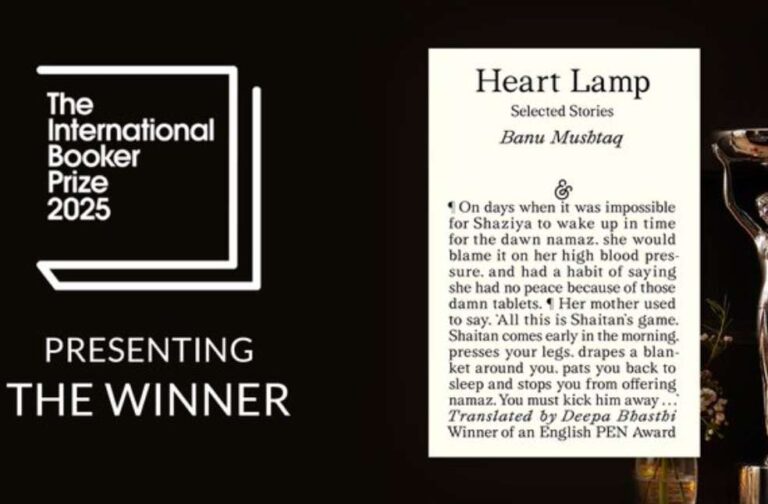India: Indian writer-lawyer-activist Banu Mushtaq has made history as the first Kannada author to win the prestigious International Booker Prize, awarded for her short story anthology, Heart Lamp. The collection, translated into English by Deepa Bhasthi, features 12 poignant tales written over three decades, highlighting the lived experiences of Muslim women in southern India.
Heart Lamp’s win celebrates a milestone for regional Indian literature on the global stage. The stories, set in Karnataka’s deeply patriarchal and religiously conservative settings, reflect Mushtaq’s lifelong engagement with themes of gender, faith, and resistance.
Mushtaq’s journey from a small-town Muslim girl studying the Quran in Urdu to an acclaimed Kannada writer is as influential as her fiction. Encouraged by her father, she studied in a convent school where Kannada was the medium of instruction, an alien language that she later embraced for her literary voice. Her first story was publicised after a turbulent start to her marriage, a phase marked by domestic challenges and postpartum depression.
Watch the moment Heart Lamp was announced as the winner of the #InternationalBooker2025.
Discover the book: https://t.co/zwWnDmkLV4@andothertweets pic.twitter.com/2NdxGkiay3
— The Booker Prizes (@TheBookerPrizes) May 20, 2025
In interviews, Mushtaq has spoken candidly about the oppressive gender roles she faced and the expressive turmoil that nearly drove her to self-harm. But it was through these personal struggles that she found the emotional depth for her fiction. Mushtaq stated that, “I had always wanted to write but had nothing to write about until life gave me something.”
Mushtaq’s protagonists mirror her spirit, resilient, quietly rebellious, and rooted in reality. Unlike stereotypical depictions of Muslim women in mainstream literature, her characters push back against societal constraints in subtle but significant ways.
Beyond literature, Mushtaq has also worked as a journalist, lawyer, and social activist, with deep ties to the Bandaya movement, a literary and activist platform focused on addressing caste and gender injustices. Her body of work includes six short story collections, a novel, and essays that challenge religious orthodoxy and patriarchal norms.
Her fearless voice has often come at a cost. In 2000, she received threats and even survived a knife attack after advocating for Muslim women’s right to pray in mosques. Despite these dangers, Mushtaq has remained undeterred.
Mushtaq’s win follows Geetanjali Shree’s Tomb of Sand, which won the same award in 2022. It also adds to her growing list of accolades, including the Karnataka Sahitya Academy Award and the Daana Chintamani Attimabbe Award. In 2024, Haseena and Other Stories—an English translation of five of her earlier collections won the PEN Translation Prize.
With Heart Lamp, Banu Mushtaq has not only made literary history but also ensured that the voices of marginalised women from regional India are heard and celebrated worldwide.



